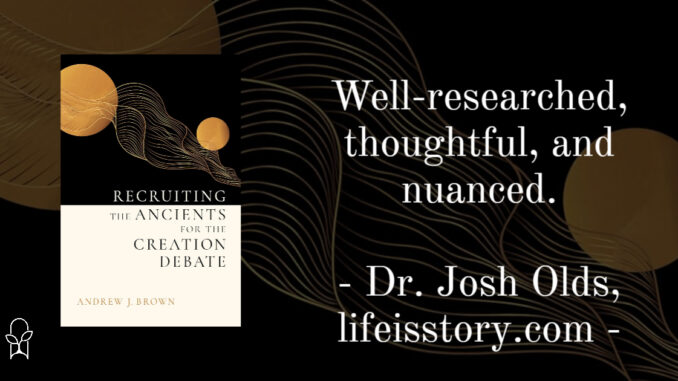
Published by Eerdmans on October 5, 2023
Genres: Academic, Non-Fiction, Theology
Buy on Amazon
Goodreads

A careful and unbiased analysis of how thinkers from church history interpreted the creation narrative in Genesis
How literally are we meant to take the creation week of Genesis 1? In this polarizing debate, contemporary interpreters invoke great theologians from history to support their own side, whether that be a young Earth, theistic evolution, or any other view.The problem lies in trying to force ancient authors into contemporary boxes, as Andrew J. Brown shows in this thought-provoking volume. Covering Philo, Basil, Augustine, Thomas Aquinas, Martin Luther, John Calvin, John Wesley, and more, Brown carefully interprets great thinkers’ readings of Genesis 1 in their intellectual contexts. He then assesses how these authors have been subject to cherry-picking and misappropriation in the trenches of the modern creation debate.
By studying the intellectual history of the church in this way—to revisit rather than recruit the ancients—we can enrich our own biblical interpretation. Irenic and magisterial, Brown’s guide will interest both scholars of historical theology and anyone invested in the creation debate.
The interpretation of the Creation narrative is one of the most contentious and divisive subjects within Christianity. Fundamentalist Young Earth Creationists (YEC) stand on one extreme of the platform, attempting to interpret every element of Genesis 1-2 literally and historically. The earth is 6,000 years old. God created in six literal days. And not believing in that means an eternity in hell. On the other extreme stands modern atheists and secularists who dismiss the creation narrative entirely. Between the two lie a myriad of interpretive options, seeking to reconcile the Creation narrative with scientific inquiry and interpret Scripture in a way that is faithful to God’s supernatural and natural revelation.
Recruiting the Ancients for the Creation Debate is a not a book meant to come to any conclusion on this matter. Rather, it is a history of how the Creation narrative has been interpreted throughout the ages and how selective interpretations of historical writings have been misappropriated—or as the Brown graciously terms it, recruited—into the Creation debate. Author Andrew Brown (OT lecturer at Melbourne School of Theology) organizes his work in mostly chronological fashion, beginning with an early Alexandrian interpretation of Genesis 1 and continuing on through the Westminster Confession and John Wesley.
Brown attempts to objectively understand how prominent theologians throughout the ages have understood Genesis 1 and detail how their understandings have been used and misused within the contemporary debates between young Earth creationists and proponents of theistic evolution. This careful analysis helps to clarify the original intentions and understandings of these ancient authors, moving away from the practice of recruiting them to support modern viewpoints and instead revisiting their works to enrich our own understanding of biblical interpretation.
This is what turns out to be Brown’s major criticism of current Creation debates: the ancients are used as appeals to authority without much care for an understanding or contextualization of their words. Just as Scripture can be misunderstood and misinterpreted, so too Scripture’s exegetes can be misunderstood and misinterpreted. Recruiting the Ancients for the Creation Debate makes the case that, all too often, modern exegetes utilize the words of ancient thinkers in improper ways. The goal is to recruit them to a side rather than view their thinking objectively and perhaps even independently of our own modern concepts.
Recruiting the Ancients for the Creation Debate is well-researched, thoughtful, and nuanced. Brown does a great job remaining neutral and academic, deflecting from his own personal views and instead point toward the need to accurately interpret and understand the ancient writers. It’s a unique book that not only contributes to the literature and scholarship on the creation narrative, but serves as a reminder for how academic study and research should be done.
